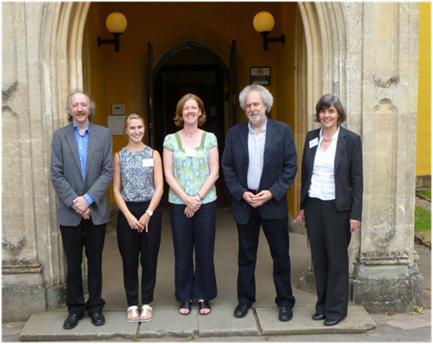
Professor Paula Williamson (c) with the COMET Team, from left, Mike Clarke, Elizabeth Gargon, Professor Doug Altman and Professor Jane Blazeby
A special Europe wide event hosted in Dublin to mark International Clinical Trials Day (ICTD) saw Professor Paula Williamson deliver a keynote speech.The University’s Head of Biostatistics, Professor Williamson emphasised the importance of patient relevant outcome measures, on a day of talks organised by the European Clinical Research Infrastructure Network (ECRIN).
Professor Williamson said: “People may think a clinical trial involves only doctors and patients. But there are also methodologists behind the scenes working out how to run the trial, how many patients to involve and how to determine which outcomes are best to measure.”
Other presentations on the day, held at Dublin Castle, included Christian Gluud from the Copenhagen Trial Unit, Denmark; Silvio Garattini from the Institute Mario Negri in Italy and Chair of the World Medical Association Ethics Committee, Norway’s Torunn Janbu.
James Lind
ICTD celebrates the ground-breaking work of James Lind, who discovered an effective treatment for scurvy in 1747.
Professor Williamson said: “ICTD is a celebration of James Lind, who undertook the first randomised trial of treatments for scurvy. Two sailors were given oranges and lemons, while other pairs were given cider, sulphuric acid, vinegar or sea water. All of the sailors died apart from the two that were given oranges and lemons. Of course, later it was discovered that it was the vitamin C in citrus fruit that cured scurvy. These days, most clinical trials are set up to look for much smaller differences, thus requiring more patients, more resources and more rigorous design.”
Professor Williamson is a founding member of the COMET Initiative, which seeks to develop best practice in choosing outcomes to measure when carrying out clinical trials.
COMET has driven home the importance of involving patients in the process, to ensure the most relevant evidence is produced when trials are carried out.
Professor Williamson added: “In Dublin, I demonstrated that clinical trials and trials methodology is a key area of strength in Liverpool. It’s not just that we develop clinical trials, but that we also develop the methodology.”